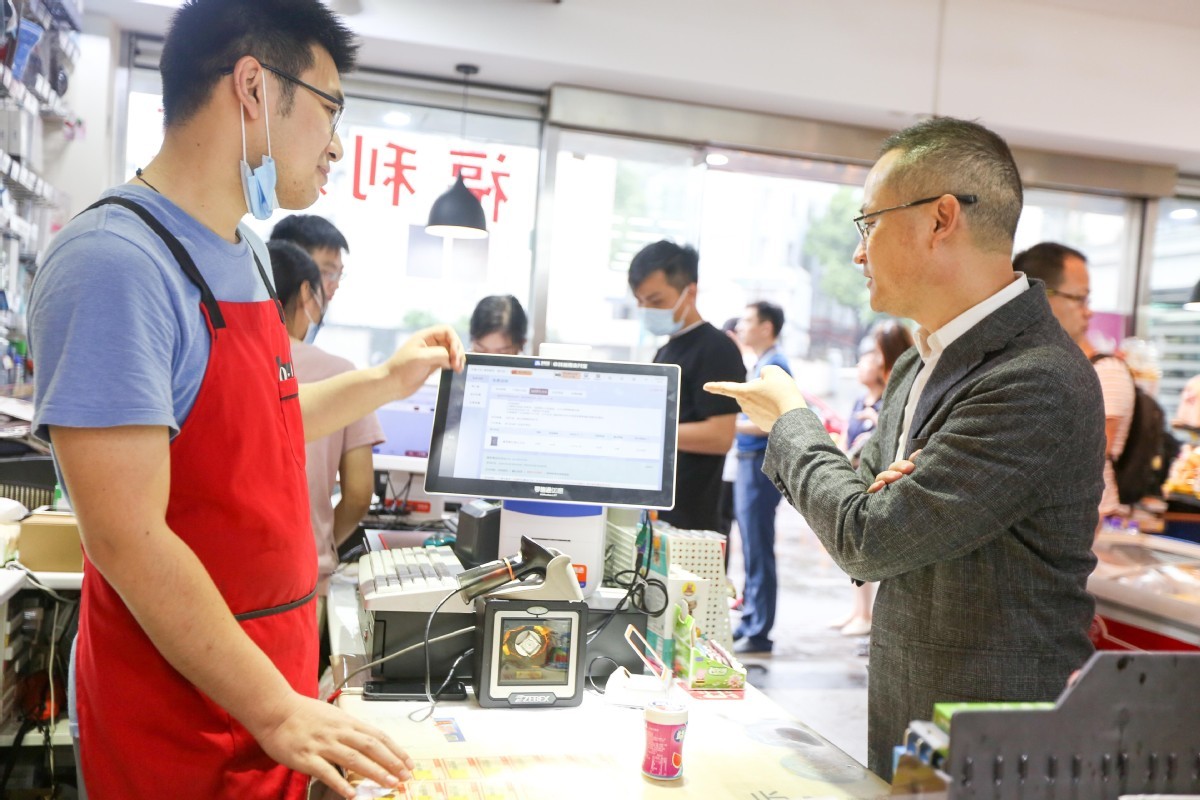
Lin Xiaohai (right), Alibaba vice-president and general manager of its LST business, checks a smart POS system at a small shop in Hangzhou, Zhejiang province. (Photo: CGTN)
E-commerce giant to extend digital OS to 1.5m neighborhood stores in nation
Alibaba Group said on Friday that it would extend its digital operating system to 1.5 million small neighborhood stores in China, as the e-commerce giant looks to boost sales and improve efficiency of domestic retailers.
Under the so-called Plan W, Alibaba is looking to foster a number of smaller shops with a daily revenue of over 10,000 yuan ($1,456) in lower-tier cities, townships and villages.
The latest move falls under Alibaba's Ling Shou Tong (LST) business unit, which connects the millions of street stands in China and improves marketing, delivery, and inventory management abilities through digital means. The data-backed retail management system has been designed to digitize the business of millions of mom and pop stores and neighborhood convenience stores.
Alibaba will dedicate a smart point-of-sale system, some 10,000 exclusive new product offerings, and a variety of online touchpoints to help users access offline stores virtually, said Lin Xiaohai, vice-president of Alibaba Group and general manager of its LST business.
"We want to help these mom and pop stores double or even triple their revenue," said Lin. "They can sell more efficiently, and get flexibility to replenish stocks based on their changing needs."
The dedicated POS machine incorporates every function throughout the retail process and provides real-time suggestions. For instance, it would send out alerts on potential stock shortage, and would recommend the procurement of cost-effective or high-gross margin items to enhance the store's profitability.
"The machine also collects average selling price for a certain product in the adjacent area of where the store is located, thereby giving references to shop-owners to make informed pricing decisions," said Xiao Xinying, an Alibaba staff member on smart store solutions.
A clutch of Alibaba's sister apps, from mobile wallet Alipay, mapping service Amap to on-demand platform Ele.me, also connects millions of users with smaller stores based on their locations.
Furthermore, an inventory monitoring system is in operation to give real-time advice on product display and portfolio adjustment. This is coupled with a three-layer warehouse system covering 200 cities and townships to ensure the timely delivery of products, based on geographical shopping preferences that are present in Alibaba's data book.
Despite lackluster consumption growth at home and abroad, one in every five small shops surveyed by LST reported they have bucked the trend and witnessed positive revenue growth. Average daily revenue surpassed 7,000 yuan, as compared with the 3,000 yuan to 5,000 yuan range for average offline stores.
Luo Dandan, who operates the Dandan Supermarket in Yiwu of Zhejiang province, is a beneficiary of the LST program. She said normal daily revenue stood somewhere between 1,000 yuan and 2,000 yuan, thanks to the string of smart recommendations offered by the digital solutions.
"During the height of the pandemic, when other physical stores were forced to shut due to social distancing in place, we saw online orders surging via multiple online channels like Alipay and Ele.me," she said, adding that average spending price was around 500 yuan.


